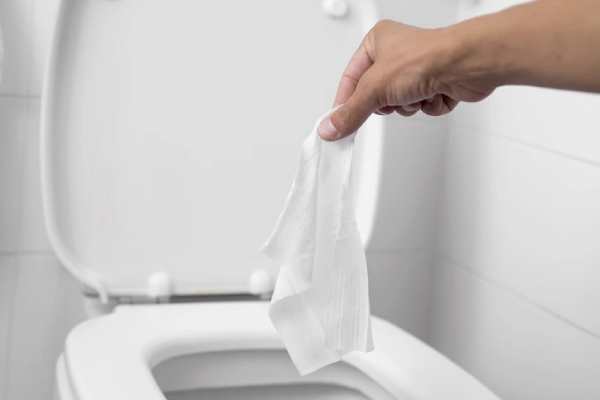
Protect Your Drains and Save Money by Preventing Clogs
Flushable wipes have become incredibly popular in recent years as a convenient and hygienic alternative to toilet paper. Many consumers trust the label “flushable,” assuming these wipes are safe for their plumbing systems. But is that really the case?
At Mr. Rooter® Plumbing of Southeast Georgia, we’ve seen firsthand the damage these products can cause, and we want to set the record straight. This blog will uncover the truth about flushable wipes and their impact on your plumbing and offer better alternatives to protect your home and the environment.
What Are Flushable Wipes?
Flushable wipes are marketed as a more durable, sanitary alternative to toilet paper. Made from synthetic fibers like polyester, they’re used for personal hygiene, cleaning, and makeup removal. Unlike regular wipes, they claim to be safe to flush. However, "flushable" often just means they can pass through a toilet without clogging, not that they break down in plumbing or wastewater systems like toilet paper.
Flushable wipes are distinct from toilet paper in composition. While toilet paper is made from biodegradable materials that dissolve almost instantly in water, flushable wipes are often reinforced with sturdier fibers that take much longer to degrade. This raises serious concerns about their compatibility with modern plumbing systems.
Do Flushable Wipes Actually Break Down?
Here’s the real question—do flushable wipes actually break down once you flush them? Unfortunately, the answer is “not really.” Unlike toilet paper, which is engineered to disintegrate quickly in water, most flushable wipes can remain intact for days or even weeks in a plumbing system.
Studies show that wipes labeled as flushable often fail to break down quickly enough, causing plumbing issues. For example, the National Association of Clean Water Agencies (NACWA) reports on "fatbergs"—massive blockages of grease, debris, and wipes that don’t disintegrate properly. One study found that flushable wipes take much longer to break down than toilet paper, straining both residential and municipal plumbing systems.
The Hidden Dangers of Flushing Wipes
Clogged Pipes
One of the most common problems caused by flushable wipes is clogged pipes. These products can combine with other debris in your plumbing system, leading to stubborn blockages that can result in slow drains, backups, or even pipe damage. Homeowners often underestimate how quickly a few wipes can accumulate and affect their plumbing.
Sewer Backups
Flushable wipes don’t just cause issues in your home—they’re a major nuisance for municipal sewer systems, too. When wipes don’t break down, they gather with other waste, forming large blockages that slow down or entirely block sewage flow. These backups are not only expensive to fix but can also lead to health hazards and environmental problems when untreated sewage overflows.
Septic System Damage
For homeowners with septic systems, flushable wipes can be extremely harmful. Unlike toilet paper, which breaks down and integrates with the system, wipes accumulate and impair septic functionality. Over time, this can lead to system failure, requiring costly repairs or replacement.
The Bigger Problem: Wipes and Environmental Impact
The problems with flushable wipes go beyond plumbing. Flushed wipes often end up in waterways, polluting and harming wildlife. Made with synthetic materials, they take years to break down, leaving microplastics that enter the food chain. Wastewater treatment plants also spend time and resources removing wipes, diverting attention from other critical tasks.
Municipalities across the country have reported massive increases in maintenance costs due to blockages caused by wipes. This has prompted some regions to implement public awareness campaigns or even regulations against labeling wipes as flushable.
What Should You Do Instead?
While flushable wipes may seem convenient, they are far from safe for your plumbing. These products often take too long to break down, resulting in clogged pipes, sewer backups, and septic system damage. Beyond the plumbing issues, improperly disposed wipes also contribute to environmental pollution.
To avoid the problems caused by flushable wipes, consider the following alternatives:
- Dispose of Wipes in the Trash: Simply throw used wipes in a trash can. Keep a small, covered bin in your bathroom for convenience.
- Switch to Eco-Friendly Options: Try bidets or eco-friendly toilet paper alternatives that are safe for plumbing and the environment. Some bidets even have drying features, removing the need for paper products.
- Be Mindful About What You Flush: Only flush human waste and toilet paper. Products like paper towels, sanitary items, or "flushable" wipes should go in the trash.
If you’re dealing with clogged drains, sewer line issues, or any other plumbing problems caused by flushed items, Mr. Rooter® Plumbing of Southeast Georgia is here to help. Our team of licensed professionals has years of experience handling even the toughest plumbing challenges. Don’t wait until a small issue becomes a big problem—give us a call today for expert plumbing repairs and maintenance tailored to your needs.
Request an appointment today!

